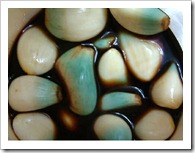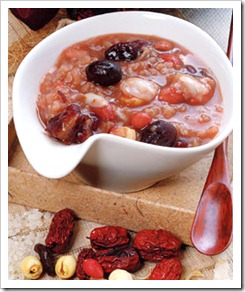Laba is a Chinese festival that has traditionally started off the Chinese New Year preparations. It’s on the eighth day of the twelfth lunar month.
Agnes wrote about it from China:
"We eat Laba Rice Porridge and Laba Garlic for the Laba Festival. Laba Porridge is made of mixed grains and corns, like peanuts, chestnuts, dates and lotus seeds.
We put garlic into a bottle of vinegar. When the garlic becomes green, the Laba Garlic is done."
The Laba Garlic is taken out on New Year’s Eve. The vinegar is used to dip the traditional dumplings in.
Here’s an old song in Chinese and with an English translation about the Laba Spring Festival. It’s also about preparations for the Chinese New Year and the New Year itself. Interesting explanations by Agnes can be found below the song.
腊月歌
小孩儿小孩儿你别馋,
过了腊八就是年。
腊八粥,喝几天,
哩哩啦啦二十三。
二十三,糖瓜儿粘;
二十四,扫房子;
二十五,冻豆腐;
二十六,炖白肉;
二十七,宰公鸡;
二十八,把面发;
二十九,蒸馒头;
三十儿晚上闹一宿;
除夕饺子年年有。
大年初一扭一扭;
初二、初三满街走。
The 12th Lunar Month
Kids, kids, don’t be impatient,
Laba is coming, the Spring Festival isn’t far away.
We eat Laba porridge for several days,
The 23rd day of the twelfth lunar month is coming la la la!
On the 23rd day, kids have sticky Tanggua candy (1)
On the 24th day, we sweep the house. (2)
On the 25th day, we make frozen tofu.
On the 26th day, we stew the pork.
On the 27th day, we make the chicken.
On the 28th day, we ferment the dough, (3)
On the 29th day, we cook steamed buns.
On the 30th day, kids go downtown at night to shoot off noisy firecrackers, (4)
On New Year’s Eve we eat dumplings every year. (5)
On the first day of the New Year, we dance the Yangge (秧歌) to celebrate, (6)
And on the 2nd and 3rd days of the New Year, we go to a temple fair or to relatives’ and friends’ houses to pay a New Year’s visit.
Song Notes:
(1) On the 23rd day, people worship the Kitchen God (灶王爷) with Tanggua (a kind of candy). It is said that the Kitchen God of China is a god who likes to gossip very much. On the 23rd day of the last month of every year, he must go back to heaven to report on the conduct of families. So people give him some sweet and sticky candies called "Tanggua" to gag him.
(2) From 24th to 29th days, this is a kind of description about how people prepare for the Spring Festival.
(3) The dough for making steamed buns is fermented a day in advance.
(4) On the 30th day of the twelfth lunar month, all family members get together to have dinner, to shoot off firecrackers, to pass on good wishes to each other. We must stay up late together to pray for long life, we call it "Shousui" (守岁).
(5) Chuxi is another name of the 30th day of the twelfth lunar month. On the evening of Chuxi, usually at twelve midnight, Chinese people have dumplings to celebrate the New Year.
(6) On the first day of the New Year, we dance the Yangge (秧歌) to celebrate. We say "Niu Yangge" (扭秧歌) in Chinese. Yangge is a kind of traditional dance that celebrates a good harvest and festival in the most northern areas of China. Below you can see a video of the Yangge Dance…
Agnes wrote, "We have lost most of the old customs for the Chinese New Year in the big cities. Now, we just have dinner and dumplings together on the night of Chuxi. I loved the way of worshiping the Kitchen God of my grandpa and grandma. But I never saw the ritual myself. The atmosphere of the Spring Festival has become less and less interesting."
Many thanks to Agnes for sharing this song and for explaining old Chinese New Year traditions to us.
Song translation by Agnes and Lisa. (We welcome help to improve the translation.)
Photo Sources:
This article was posted on Tuesday, February 5th, 2013 at 5:45 pm and is filed under Children's Songs, China, Chinese, Chinese Children's Songs, Chinese Cuisine, Chinese New Year, Chinese New Years Songs, Countries & Cultures, Cuisine, Dances, Games Around the World, Holiday Songs, Holidays Around the World, Laba, Languages, Recipes of the World, YouTube. You can follow any responses to this entry through the RSS 2.0 feed. You can skip to the end and leave a response. Pinging is currently not allowed.
One Response to “A Children’s Song about The Laba Spring Festival from Ancient Beijing that Starts off Chinese New Year Festivities”
Leave a Reply


























February 5th, 2013 at 6:51 pm
Ray, who grew up in Hong Kong, wrote the following when I asked if he celebrated Laba and if people get haircuts for the Chinese New Year:
“People (men and children) do shave and get haircuts for the Chinese New Year. I don’t remember celebrating Laba though. This could be something that is more of a northern China thing.”